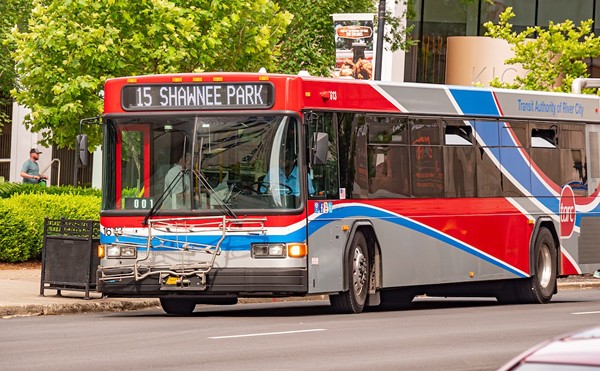Ford Motor Company hired a new president and chief executive officer to try to help the struggling automaker figure out why oh why oh why it’s losing money at the rate of about $3 billion per year. The company hired Alan Mulally, an expert from another polluting, fuel-guzzling, dangerous, totally screwed industry: air transportation. Mulally is the former leader of Boeing, a company whose products are widely admired for their lack of knee room and breathable air. Stepping aside to make way for Mulally is Ford executive chairman Bill Ford, who will stay at the helm but be given a padded office, with plenty of soft objects with no sharp edges to play with — but maybe a Hot Wheels set if he’s good.
Meanwhile, Ford is struggling with how to implement a major retooling of its manufacturing plants, possibly including the Kentucky Truck Plant and the Louisville Assembly Plant. The company has announced plans to cut 30,000 jobs and close seven plants, despite the fact that “President” Cheney has ordered gasoline prices lowered by 50 cents per gallon in advance of the upcoming election. Hoping to persuade Ford to keep its Kentucky plants in business, Mayor Abramson and Gov. Fletcher traveled to Michigan last week to offer the company tax breaks, juleps, some of those little Louisville Slugger bats and free reign to, like, totally pollute our air.
To reward Mulally for an outstanding first two days on the job, Ford gave its new boss a variety of bonuses on top of his $2 million salary, including a $7.5 million hiring bonus, an $11 million forfeiture bonus to offset his Boeing stop options, and the right to randomly “pants” and poke in the eyes up to 25 production workers per week. —Jim Welp
Obama headlines free Democrat rally Thursday

U.S. Sen. Barack Obama: will be the keynote speaker at a Democratic rally for local candidates Thursday at Slugger Field.
That critical mass offers as good as explanation as any for Thursday’s visit from U.S. Sen. Barack Obama, who is arguably the party’s biggest star these days. Obama will speak during a free rally Thursday night at Slugger Field that is open to the public. A long list of local Democratic candidates has been invited.
“We’re tickled to death” about the visit, said Tim Longmeyer, chair of the Louisville-Jefferson County Democratic Party. “He’s the most sought-after Democratic speaker, and we’ve been trying to get him in here for a while now.”
Thursday’s event begins at 6 p.m., with doors opening at 5. For more information, call 582-1999.
In another political development, MoveOn.org is asking members to vote for which candidate the organization should endorse in Kentucky’s 3rd District race between Northup and Yarmuth. Whichever candidate receives two-thirds of member votes will get the endorsement; if neither gets two-thirds, MoveOn will not make an endorsement in the race. For more information, go to www.moveon.org. —Cary Stemle
Making housing affordable in Metro Louisville
Since the years of President Ronald Reagan’s administration, federal funding to help people with low to medium incomes purchase their own homes has decreased by more than 65 percent, says Mary Brooks, director of the Housing Trust Fund Project at the Center for Community Change, a national non-profit organization that works with government and community organizations to advance policies to combat poverty.
In the intervening years, state and local leaders in the private and public sectors nationwide have taken on the duties of creating their own programs and finding the revenue to make housing affordable for low-income wage earners, such as service workers, who they see are vital to economic stability and growth. And during that time, Brooks has advised many of these leaders.
Over the past two years, she visited Louisville several times as leaders worked to establish a state affordable trust fund. During the last session of the Kentucky General Assembly, lawmakers established an affordable housing trust fund. (Affordable housing should be 30 percent of a household’s annual income, according to the federal government.)
This week Brooks is visiting Louisville at the invitation of Mayor Jerry Armstrong to speak to his Affordable Housing Trust Fund Task Force, established last year as part of a comprehensive housing strategy for Metro Louisville. Metro Government reports that roughly 47 percent of Metro Louisville’s 278,000 households qualify for financial assistance for housing.
Brooks is speaking to the task force and members of Metro Council about how other cities have set up such trust funds and found ongoing, dedicated sources of public revenues for them to create stable affordable housing programs.
Melissa Barry, a member of the task force and director of Louisville’s Metro Housing and Community Development department, says she hopes Brooks will be able to add insight into the research the task force has already completed in its effort to get a report with recommended strategies by November. —Elizabeth Kramer
Big state you
Nowadays a master’s degree is the new bachelor’s degree and a bachelor’s degree is the new high school diploma and a high school diploma is the new “Ernest T. Bass Diploma for Learning.” So there’s only one sensible course of action if Kentucky wants an educated work force for the information-age economy: increase funding for public higher education, right? Natch, your no-taxes-at-any-costs state and national Republican leaders have done exactly the opposite in recent years, cutting funding and driving tuition costs up, in turn driving middle-income families deeply into debt and making college unaffordable for many students from poor families.
The result is an “F” grade for Kentucky on higher-education affordability on a report card from the National Center for Public Policy and Higher Education, a national education watchdog that’s keeping a close eye on America’s gradual slide to becoming Asia’s concubine. But Kentucky officials (who announced plans to correct the situation by converting the “F” to a “B” when nobody’s looking) can take heart: A mind-boggling 43 states also received “F” grades, which is a powerful statement about what our leaders can do when they really set their minds to screwing the pooch.
Couldn’t get more pathetic than that, right? Enter into this absurd climate Sen. Tom Coburn (R-OK), who last week called out Kentucky’s Sen. Mitch McConnell for trying to direct grants to U of L and UK without enough congressional oversight. Coburn, who is perhaps jealous of Kentucky because its kids are slightly less uneducated than Oklahoma’s, seemed concerned that facilities in Kentucky often seem to turn up with names McConnell and Chao attached to them. Not surprisingly, McConnell refused to directly address Coburn’s concerns, but U of L president James Ramsey said, “The McConnell earmarks have been critical to our university. The McConnell Chao Chao money McConnell is money McConnell. Money McConnell Chao McConnell McConnell.” He then coughed and looked at his shoes.
Bringing some sense to the whole situation was Gov. Ernie Fletcher, who forcefully stepped in and declared September “College Savings Month.” The exciting proclamation “encourages parents to save for college,” because Lord knows, you’re on your own, people. —Jim Welp
The 4-1-1 on 2-1-1
It all started with 9-1-1, for emergency calls. Then there was 4-1-1, a.k.a. directory assistance. Then Louisville got 3-1-1, or MetroCall, which provides information on local government services. Then, on Sept. 1, Metro United Way launched a publicity campaign for 2-1-1, an assistance line that provides callers with information about health and human services offered by local public and non-profit organizations. Operators at the center can tell callers from nine Kentucky counties (including Jefferson) and three Southern Indiana counties where they can get assistance if they are unemployed, if they have a disabled relative in need of adult day care or if they are having problems paying rent.
Glen Powell, director of the 2-1-1 program, says he expects the call center to see a 40-percent increase in the roughly 7,000 calls it was receiving before Metro United Way began its campaign.
Meanwhile, Scott Been, the call center manger who works at Seven County Services Inc., Metro United Way’s partner in this program, says most calls seem to be from people wanting to know more about 2-1-1 and how it is different from 4-1-1 and 3-1-1. He says most callers with specific questions ask about where they can find financial support to help them meet basic expenses while they are dealing with misfortune, including being laid off from work or becoming ill.
Some callers don’t understand that 2-1-1 is tool to connect people with service organizations, and not the services themselves. They have called asking about their specific Social Security benefits or health insurance policies.
“It will take some time for us to educate the public about the service, but in the end it will be a huge resource for the community,” he says, adding that the center tracks the calls and their nature in a database. “This can help us track needs in different areas, for example, the need for more child care in the South End. That gives us and the city information it can use to know where the needs are and begin thinking of how to address them.”
So far, Been says, no operators have received calls about missing pizza delivery orders. —Elizabeth Kramer
Contact the writers at [email protected]





